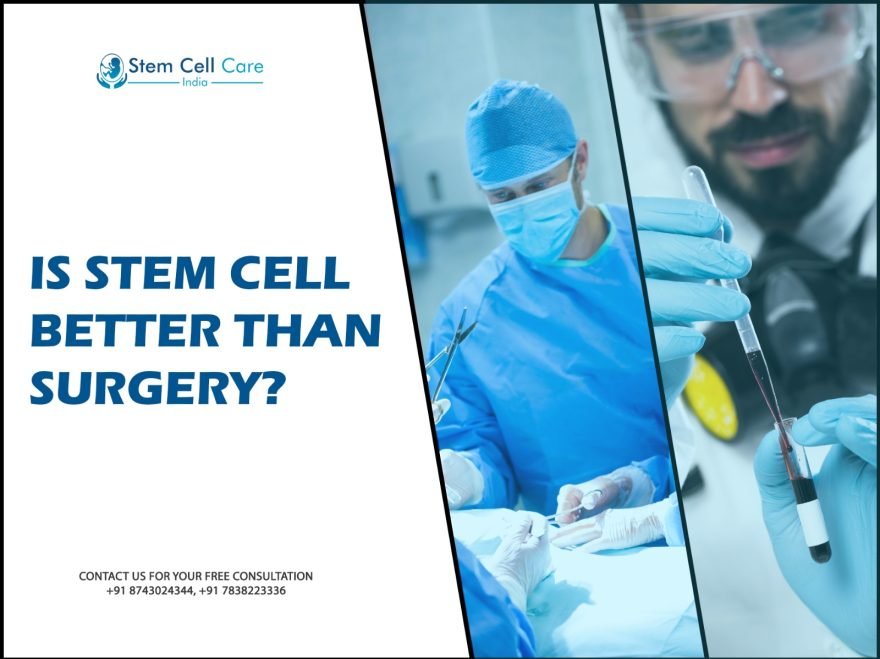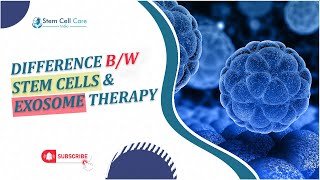When faced with debilitating conditions & diseases, patients typically seek treatments that provide the best results with the least invasive methods. No worries, the recent advancement in medical science, stem cell therapy in India has emerged as a promising alternative to traditional surgical procedures, sparking a debate on whether it might be a good option. Let’s explore the possible benefits and reasons for stem cell therapy compared to surgery.
What is the Stem Cell Therapy?
The most common question of every patient, who might be considering this therapy, let me answer it for you. In stem cell therapy, damaged organs and tissues are replaced, renewed, or repaired using stem cells. These cells are healing and regenerating cells that can differentiate into different cell types. Stem cell therapy is being studied for a vast range of conditions, such as orthopedic injuries, neurological disorders, cardiovascular disease, and autoimmune conditions.
Benefits of Stem Cell Therapy
- Minimally Invasive: The most significant benefit of stem cell therapy, is its minimally invasive nature. Not like surgery, which typically requires large incisions and extensive recovery periods, stem cell therapy is commonly administered through injections. This means less pain, minimized risk of complications, and rapid recovery times for patients.
- Reduced Recovery Time: The surgical process can take need weeks or even months of recovery and rehabilitation. In contrast, patients undergoing stem cell therapy commonly experience shorter recovery periods. This is solely beneficial for athletes and active individuals who seek to return to their routines as soon as possible.
- Lower Risk of Complications: Some surgeries carry inherent risks, such as infections, blood clots, and anesthesia complications. Stem cell therapy, being less invasive, typically has a lower risk of such complications. The use of autologous stem cells further reduces the risk of immune rejection and adverse reactions.
- Regenerative Potential: This stem cell therapy provides the potential for true regeneration of damaged tissues. While surgery typically focuses on repairing or removing damaged tissue, stem cells can promote the growth of new, healthy tissue. Because of these regenerative qualities, stem cell therapy may be able to treat diseases for which traditional surgery has few other options..
- Versatility: Stem cell therapy is being studied and used in a number of medical specialties. Because of their versatility, stem cells hold great promise for treating conditions like osteoarthritis, spinal cord injuries, heart disease, and even certain types of cancer. Nowadays, surgery is the only option for many conditions.
India is now a center for cutting-edge medical care, including stem cell therapy. With modern facilities, experienced medical professionals, and a growing body of research, stem cell therapy in India is gaining recognition worldwide. Modern medical methods are supported by the nation’s healthcare system, which draws medical tourists looking for accessible and efficient treatments.
When Is Surgery Necessary?
While stem cell therapy offers many benefits, there are situations where surgery remains the preferred or necessary option. For instance:
- Acute Injuries: Severe traumatic injuries, such as compound fractures or torn ligaments, often require surgical intervention to stabilize and repair the damage.
- Cancer Treatment: Certain cancers may require surgical removal of tumors, followed by additional treatments like chemotherapy or radiation.
- Structural Abnormalities: Congenital or acquired structural abnormalities, such as herniated discs or severe spinal deformities, may need surgical correction.
- Emergency Situations: In cases of acute medical emergencies, surgery may be the only viable option to save a patient’s life.
Combining Stem Cell Therapy and Surgery
In some cases, a blend of stem cell therapy and surgery can provide the best results. For instance, stem cells can be used to enhance the healing process after surgical repair of a torn ligament or to regenerate cartilage following joint replacement surgery. This integrative approach leverages the strengths of both treatments to optimize patient recovery and long-term health.
Conclusion
Both surgery and stem cell therapy have special benefits and uses. While surgery is still necessary for acute injuries, structural corrections, and some medical emergencies, stem cell therapy offers a less invasive, regenerative option with lower risks and faster recovery times. Depending on the particular condition, the patient’s health, and the medical team’s experience, stem cell therapy or surgery may be chosen. However, if you wish to learn more about stem cell therapy in Delhi, you can contact and book a consultation session with Stem Cell Care India.











